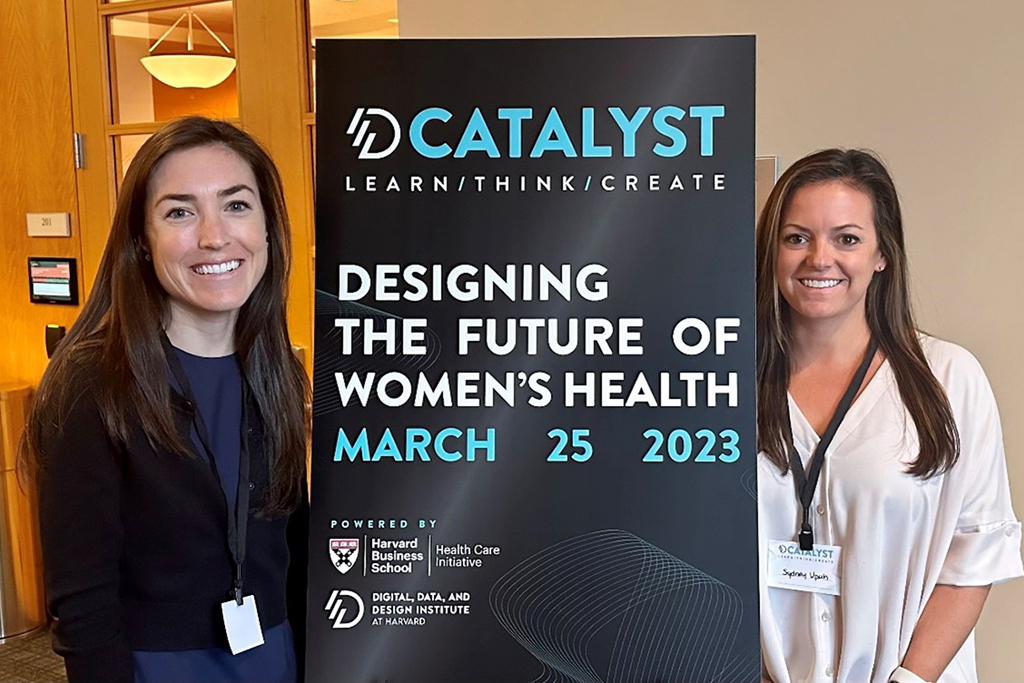
Blog | 4/4/2023
Reflections from Harvard Business School’s D^3 Catalyst Women’s Health Workshop 2023
By Leah DeMartini and Sydney Upah
Recently Health Advances had the pleasure of attending the D^3 Catalyst workshop, “Designing the Future of Women’s Health” at Harvard Business School. We are excited to share a recap of this event on the Health Advances Blog and as part of our long running #WomensHealthWednesday series on LinkedIn. This unique workshop highlighted obstacles and opportunities in women’s health via expert panels and a design sprint, all seamlessly moderated by HBS professor Rem Koning.
Despite existing barriers, there are multiple new opportunities within women’s health evidenced by an uptick in public interest and investment, heightened awareness of industry barriers, and several new female-specific solutions in development. Design teams tackled women’s health topics including gynecologic health, menopause, ageing, education, and AI. Our team explored ways to increase the diagnosis rates of gynecologic health issues; we proposed a standardized screening questionnaire to assist clinicians in earlier detection and more proactive testing for niche conditions such as endometriosis.
We enjoyed hearing from Ridhi Tariyal, Co-Founder and CEO of NextGen Jane, Inc., Anula Jayasuriya, Founder and Managing Director of EXXclaim Capital, and Caroline Mitterdorfer, Co-Founder and CEO of Levy Health about the importance of women’s health, ongoing challenges, and opportunities on the horizon. Funding remains a chief concern highlighted by all panelists: “For big science you need big checks. Writing small checks only fosters small science.” Though more women are entering venture capital firms, innovators continue to pitch ideas to predominately male audiences, with few women having final decision-making capabilities. Navigating a landscape with scarce funding requires fluctuation in business models, which often begin as D2C to obtain proof of concept before payer involvement. Before subsidizing initiatives for women, employers require data to support proof of concept, but the reality is that this data often takes years to gather. Thus, many investors and start-ups are pressured to provide short-term ROI for longer-term concepts.
Conditions previously labeled taboo, such as endometriosis, menopause, and menstrual abnormalities, continue to face headwinds relative to other female-specific diseases lacking stigma, such as breast cancer. The broader societal issues and lack of attention to women’s concerns were addressed numerous times throughout the day. Just last week, we saw Bayer, a long-time female-focused company, deprioritize women’s health. The historical lack of attention in the women’s health space contributes to a paucity in data and continues to hinder future opportunities.
The afternoon panel was comprised of Aakanksha Gulati, PhD. of the Wyss Institute, Linda Griffith, PhD at MIT, Jannine Versi, Co-Founder and COO of Elektra Health, and Catherine Jonash, Senior Director of Client Success at Maven Clinic. These incredible speakers analyzed and celebrated past successes, while looking at ongoing challenges and industry gaps. Is the wage gap between men and women contributing to the health gap?
Key advice to future innovators included:
- Remain strategic with a central focus.
- Be mindful of app-fatigue.
- Provide an effective platform to consolidate care and combat a traditionally fragmented landscape (e.g., primary care, obstetrics, fertility, and menopause).
- Communicate the opportunity and awareness effectively to gain buy-in.
- Be prepared to work with incumbents including commercial and public payers.
Thank you to Rem Koning, Krys Mroczkowski, and Doug Ng for bringing attention to women’s health with this incredible workshop.
###
Leah DeMartini, Consultant and member of the Precision Medicine, Digital Health, and Health IT practice areas.
Sydney Upah, Consultant and member of the MedTech, Digital Health, and Health IT practice areas.

